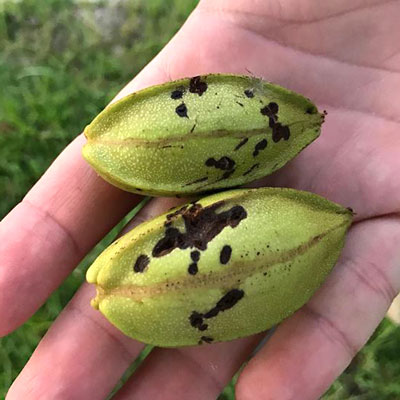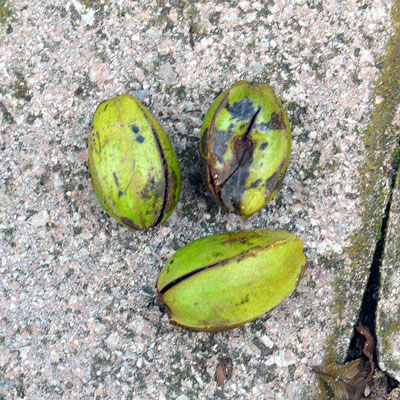Question of the Week Number 2: August 2, 2018
“Why are my pecans turning black and falling this early? Can they be salvaged?”

You can see the impact of pecan scab showing up on the husks of these recently fallen pecans.
This is pecan scab, and it causes tons (literally) of pecans to fall prematurely from late July through August and into September each year. Scab gets on the pecans in late spring as they are developing, but it really doesn’t show up and cause problems until late summer. The pecans that fall prematurely are ruined.
Some varieties of pecans are much more resistant to pecan scab than others. You’ll see them listed in gardening references and on nursery websites as “eastern” varieties because they do well in the more humid eastern parts of the state where pecan scab is much more of a problem. Some of the best include Caddo, Pawnee, Desirable and Kanza. So your first step in dealing with scab if you live near or east of I-35 is to plant one of those varieties.

This is how pecan scab quickly develops. The outsides will become blackened, and the kernels will become black and watery inside.
You could also spray your pecans to protect them against this fungus. That spray program would have to begin in the spring and continue clear into late summer. Each time that you spray for pecan casebearers, hickory shuckworms or weevils, you would want to include the fungicide to address pecan scab.
Your local independent retail garden center owner or manager may have products labeled for such spraying, or you may need to work with a farm supply dealer. Don’t be surprised if it’s difficult to find fungicides for control of scab at your neighborhood store where you buy other garden supplies.
The additional issue is that homeowners usually don’t have the types of spray equipment it takes to reach the tops of tall pecan trees. For that reason many of us prefer just to take our lumps with pecan scab and harvest those pecans that escape the disease and mature normally. Usually there are plenty to go around.
Texas A&M has excellent information on commercial production of pecans. Much of it is very useful to home gardeners as well. Click here to see one such Fact Sheet.
